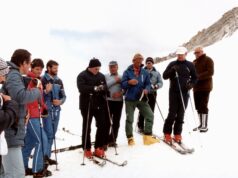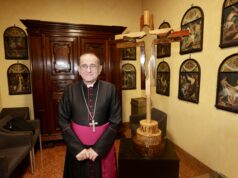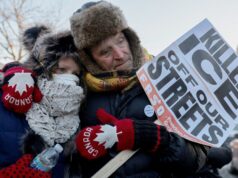
BALTIMORE — Archbishop William E. Lori of Baltimore and leaders of the Knights of Columbus and Catholic Near East Welfare Association visited Jerusalem, the Palestinian West Bank and other parts of the Holy Lands Sept. 2-6, connecting with ministries serving those in the conflict area.
“What you see is that even in a time of great darkness and suffering, the light and the goodness and the glory of Christ shine through in these ministries,” Archbishop Lori said upon his return to Baltimore.
“We came as pilgrims of hope. Certainly, we wanted to be a witness of hope to folks who are having a really hard time, but they also strengthen our hope. It was what the synod calls an exchange of gifts,” he told the Catholic Review, Baltimore’s archdiocesan news outlet.
The pastoral visit was organized by CNEWA-Pontifical Mission, based in New York City, that supports the diverse humanitarian and pastoral works of the Eastern churches throughout the Middle East, Northeast Africa, India and Eastern Europe.
Msgr. Peter I. Vaccari, president of CNEWA, was accompanied by Archbishop Lori as supreme chaplain of the Knights of Columbus; Supreme Knight Patrick E. Kelly; and John A. Marrella, the Knights’ supreme secretary.
In addition to his role as archbishop of Baltimore — his “first love and first responsibility” — Archbishop Lori wore several hats on the trip: as supreme chaplain for the Knights; as vice president of the U.S. Conference of Catholic Bishops; and as prior of the Middle Atlantic Lieutenancy of the Equestrian Order of the Holy Sepulchre, which also supports the Christian communities in the Holy Land.
The Knights of Columbus have supported efforts of the Latin Patriarchate of Jerusalem for a long time, under the auspices of the organization’s Pacem in Terris Fund, named for St. John XXIII’s 1963 encyclical on truth, justice, charity and liberty.
However, the archbishop said, “given the disaster that is unfolding in Gaza, given the ongoing challenges of the center in the West Bank, we wanted to learn from CNEWA, which has been there for a long time, and from the patriarch and from the custos and from various ministries on the ground what it’s like, and what we can do.”
He referred to Cardinal Pierbattista Pizzaballa, the Latin patriarch, and Franciscan Brother Francesco Ielpo, custos of the Holy Land for the Order of Friars Minor. On the visiting group’s first day in Jerusalem, they met with Brother Francesco to discuss his concerns and later met with Cardinal Pizzaballa.
Archbishop Lori said the Knights’ leadership will discuss in the coming days how the order can provide assistance, but that one opportunity came up immediately.
During a visit in Bethlehem to the Crèche, a Daughters of Charity ministry caring for abandoned babies and children, they learned the facility needed a new industrial washing machine, to which the Knights committed on the spot. The machine will be purchased through CNEWA and its local sources.
“That’s just an example of things we might do,” the archbishop said. “But I think that of great importance there is (the need for) humanitarian aid right now on the ground, especially for the people who are suffering so terribly in the Gaza Strip, but more long-term support for the schools in the Holy Land that are run by the by the church; economic opportunity for the Palestinians, many of whom are emigrating; and then also health care.”
He acknowledged that no single organization can do it all, but the question is how the Knights could be helpful in those more long-term endeavors as well.
Michael J.L. La Civita, director of communications and marketing for CNEWA, told the Catholic Review that the visit by the group was appreciated by those they encountered. “We are demonstrating our care, our concern for them as the mother church, the church of Jerusalem.”
He noted that the group visited people from the whole cycle of life: from unborn children to abandoned babies, from children in schools such as the K-12 school run by the Salesian Sisters to young adult students at Bethlehem University, from families and parishioners to those at the St. Nicholas Home for the Elderly in Beit Jala.
La Civita said Kelly and Archbishop Lori went to “learn and listen” to understand how the church is responding to “the situation of war and oppression or war and occupation impacting the community, on both sides in Israel and in the Palestinian areas.”
He said one of the problems is that unemployment is 70% in some areas, especially in the West Bank, and 100% — no employment — in Gaza.
“The church worldwide is there to support them, to stand with them, that they are not forgotten,” La Civita said, adding that the people they encountered consistently said how much they appreciated the visit of people from the U.S. demonstrating their solicitude.
La Civita said the church’s provision of aid has been “hamstrung at times by bureaucracies and by war and other negative factors. Nevertheless, the church is there and committed to reaching out and doing something to make a difference.”
Archbishop Lori said many organizations, including the Latin Patriarchate, the custos and CNEWA are working to address the humanitarian crisis and famine in Gaza.

“We’re all trying, but one of the things we can do in our country is to advocate for the people in Gaza, just as Pope Leo XIV has been doing relentlessly and correctly,” he said. “The other thing is that, of course, they haven’t had many visitors in the Holy Land lately, and simply (for the group) to show up and just to say, ‘You’re not forgotten,’ that’s also an important facet of our visit.”
The archbishop said he felt safe during the trip, even though while they were there, two rockets were fired, but didn’t get anywhere close to landing. This was not his first visit to a conflict area, as he has visited Ukraine twice since Russia’s full-scale invasion of the country in 2022.
Archbishop Lori celebrated Masses for the group at sites of great significance for the faith, including the Basilica of the Annunciation in Nazareth, where it is believed that the angel Gabriel appeared to Mary; the place in Bethlehem where St. Jerome spent 30 years translating the Bible into Latin, known as the Vulgate Bible; and the Church of the Holy Sepulcher.
At the Mass in the Church of the Holy Sepulcher’s edicule, the place where it is believed that Jesus’ body was laid to rest after the crucifixion, he cited Joseph of Arimathea and Nicodemus, prominent leaders who were secret disciples of Christ: “Even if our discipleship is no secret, we are no strangers to fear and hesitancy because of the resistance and persecution that the name of Christ still generates after more than 2,000 years.”
Those who participated in the Mass came to be renewed in hope.
“We are here in these days to plead for those in desperate straits, innocent civilians killed, injured, taken hostage, innocent people dying of starvation and disease, those who have lost their homes and livelihood to the chaos of war, those who are pawns in a high-stakes bid for dominance,” the archbishop said in his homily.
“Into this desperate situation in which all appears to be lost, we come as pilgrims of hope who trust that somehow the glory of the Lord will shine through.”
The pastoral visit follows the Aug. 12 call of the president of the USCCB, Archbishop Timothy P. Broglio, for a special collection to be taken up in parishes across the United States “to provide humanitarian relief and pastoral support for our affected brothers and sisters in Gaza and surrounding areas in the Middle East and send donated funds to CNEWA and CRS (Baltimore-based Catholic Relief Services).”
Between Oct. 9, 2023, days after Hamas attacked Israel and Israel retaliated, and now, CNEWA has provided more than $1.6 million in aid from numerous funding partners in Europe and North America for humanitarian purposes in Gaza, of which more than $1.5 million were rushed for food, medical care and psychosocial counseling, helping more than 36,400 people.










